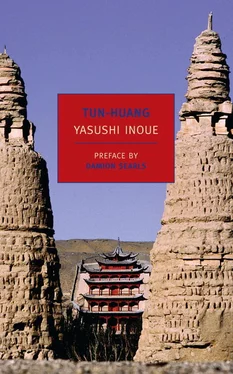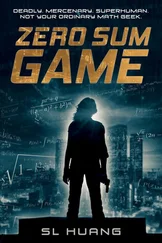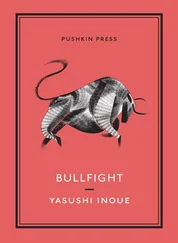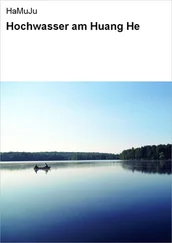The next morning, Hsing-te located Wang-li, who had gathered his unit on the banks of a dry riverbed. Not a single civilian refugee was in sight. Hsing-te was told that they had found shelter in the settlements scattered about Kua-chou.
Since Wang-li had destroyed all the newly harvested food in the warehouses outside Kua-chou, he thought that would stop the Hsi-hsia army from pursuing them immediately.
As the unit was regrouping, Hsing-te saw Governor Yen-hui approaching on horseback with ten retainers. He had sent his family to a refuge in a settlement north of Kua-chou and had come to help Wang-li. This type of behavior emphasized an aspect of Yen-hui’s character that Hsing-te admired. However, despite his bland face, Yen-hui was aroused. He kept mumbling to himself, “Save Sha-chou. Defend the temples!”
Only after Wang-li’s unit had finally re-assembled did the troops change their pace to a rapid march, befitting a military formation. They set out west for Sha-chou.
The unit marched on, hardly resting at all. It was almost one hundred miles from Kua-chou to Sha-chou, and the area to be covered was mostly desert. On a regular march, it would take seven days, but Wang-li tried to shorten that time by a day, or even half a day. He had to reach Sha-chou as soon as possible, to consult with Governor Ts’ao about a counterattack. It was a foregone conclusion that Sha-chou would be burned to the ground, just as Kua-chou had been.
The troops continued through the desert on the second and third days. Here and there were wells and mud huts for travelers. At such places, the men rested briefly, then they pushed on to the next well. The water always tasted slightly bitter. Though they walked almost continuously, the men were always cold. The biting west wind whistled through them. With its eerie noise around them, the unit continued, past rust-colored mountains as jagged as saws, mountains half buried by sand, undulating sand dunes, abandoned forts.
On the fourth morning they saw a large salt-encrusted lake. From a distance, it looked like a snowdrift. The unit marched toward it and found that it was frozen over. Despite the danger, the unit cut directly across it that night in order to save about four miles from their trip. The camels led the way.
On the fifth morning the unit reached the top of a small hill. From here, the vast desert spread out like an ocean, and in the distant northwest was a spot which appeared to be a cluster of trees. Hsing-te learned from Yen-hui that that was Sha-chou. The city was only fourteen miles away, and it would take less than a day to reach it.
For the first time since they left Kua-chou, the unit took a real rest. The soldiers lay against the horses and camels, drawing warmth from the animals as they slept. Wang-li, Yen-hui, and Hsing-te also slept in this way.
Hsing-te awoke suddenly. As he looked about, he saw the sleeping figures of the soldiers nestled against the horses and camels. The clusters of quiet soldiers, camels, and horses seemed to resemble groups of old stone statues placed in this corner of the desert hundreds or thousands of years before. Exhausted, Hsing-te did not move, his face lodged firmly against the neck of his horse. Only his eyes roamed. A little later, he turned his head slightly. In the distance he saw a caravan of about one hundred camels approaching. He gazed at the small, distant objects. Even from here, it was obvious that they were a trading caravan.
Idly he watched their progress. The caravan moved at a snail’s pace and the distance between them did not diminish perceptibly. He was not aware of how much time had passed. For a while the long caravan was hidden behind a hill, then it suddenly emerged surprisingly close.
Hsing-te continued to gaze vacantly at the camels that had come into view. He gave a sudden start as he recognized the banner, with the large dyed letter “Vai” symbolizing Vaisravana.
It could be none other than Kuang’s caravan. Hsing-te left his horse and walked toward it. Just then, the caravan came to a halt, and Hsing-te saw three men approach him. He called out loudly, “Kuang!” At that, one of the three men quickened his pace and raced toward Hsing-te. It actually was Kuang. He walked with his tall body erect as he came up to greet Hsing-te. He then asked, “Are you being transferred to Sha-chou?”
Hsing-te did not reply, but instead questioned Kuang about his destination.
“You mean us? We’re on our way to Kua-chou,” Kuang answered in his usual arrogant manner.
“Kua-chou has been completely reduced to ashes,” Hsing-te informed him. He quietly told him the details. Kuang listened attentively and then let out a groan. “Then we can’t proceed any further, can we?” He suddenly glared at Hsing-te and lashed out, “You certainly did a stupid thing. You’ll soon find out that there’s nothing more foolish in this world than what you’ve just done. Now listen well to what I have to tell you. The Muslims have started a revolution in Central Asia. In my own country of Khotan the Li family, who overthrew the Wei-ch’ih dynasty, has been destroyed. And soon the Muslims will invade Sha-chou, too. In another month Sha-chou will be crushed by the elephant brigades. The fools at Sha-chou won’t believe me, but it’s bound to happen. That’s why we’ve taken all our worldly belongings and have left Sha-chou.” Kuang stopped for a moment. “You certainly did a stupid thing. What’s going to happen to us? The Muslims are invading from the west. And the Hsi-hsia armies are coming from the east. Just where are we to go? You stupid ass!”
Kuang continued to glare at Hsing-te as though the entire responsibility for the present circumstances rested with him.
This was the first that Hsing-te had heard of Muslim activities in Central Asia. But since the information came from Kuang, who had traveled throughout that area, Hsing-te felt that there must be some truth to it.
Kuang rushed back to his caravan as if he had not a moment to lose, and Hsing-te sought out Wang-li to give him this news. Only a few of the soldiers were awake.
Wang-li was talking with Yen-hui a short distance away. Hsing-te walked over to tell them Kuang’s story. Wang-li merely cast him a glance from the corner of his eyes as if to say that Hsing-te’s words were nonsense, and then ignored him. However, Yen-hui immediately blanched and said, “When adversity strikes, it comes like this without warning. And usually bad luck comes in twos. When one misfortune occurs, the second immediately follows. Kuang’s story is probably true. From the east the dark horses of Hsi-hsia approach, and from the west the elephants of the Muslims invade. It’s not hard to believe.” He spoke very calmly, then raised his voice. “An army of elephants is coming! I saw an elephant once when I was a child. I saw one pass Sha-chou as it was being sent from Central Asia to China. Hundreds of those monstrous elephants carrying fiendish-looking soldiers will attack us, and the earth will tremble in their wake.”
Yen-hui sat abruptly on the ground, holding his head between his hands. He looked up distractedly and then shouted like a madman. “Where are we to go?” He looked up toward the heavens, as if to imply that no other place was left.
Straining his hoarse voice, Wang-li shouted, “What do we care about the Muslims? Who’s afraid of elephants? It makes no difference to us whether they come or not. Our enemy is the Hsi-hsia. It’s Yüan-hao we’re after. Those bastards are coming to kill off all the Chinese and to destroy Sha-chou so that nothing will remain of it.”
Wang-li immediately ordered his unit to set off.
Hsing-te followed Wang-li and joined him at the head of the unit. The army marched down the hill into the desert and made for the oasis on the horizon. Hsing-te saw Kuang’s caravan start about two hundred yards in front. Apparently the presence of Kuang’s caravan bothered Wang-li, and he quickened the men’s pace. But no matter how fast Wang-li’s unit traveled, the gap between the two groups did not diminish. Kuang’s banner, a solid yellow on the horizon, maintained that distance as they marched over the sand dunes.
Читать дальше












